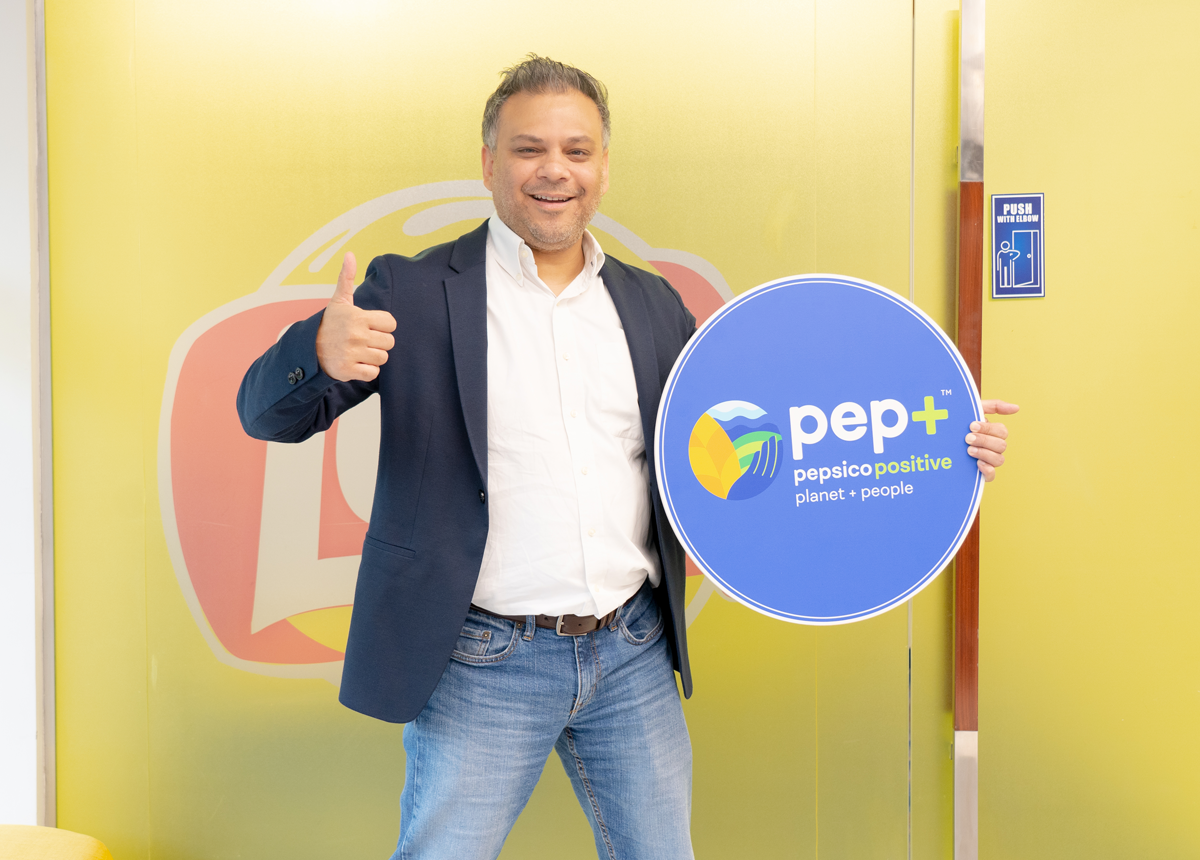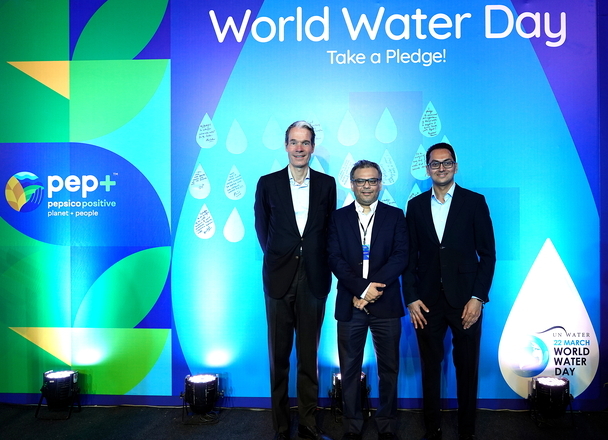Syed M Abul Hassan Kazmi, Senior Director Supply Chain Foods and Former Office of Sustainability Lead at PepsiCo Pakistan, shares how the company is committed to creating a world where sustainability is at the heart of all business achievements
As the world grapples with the impact of climate change, PepsiCo is working hard to exemplify its commitment to create sustainable solutions that will do good for people and the planet. Making a case for the progressive role of corporations in creating a better Earth for all, the company is applying its robust best-in-class business strategies to mainstream sustainability within their operations and expand outside initiatives in the communities they work with and in, along with their partners.
To learn more about some of these initiatives, an interview was conducted with Syed M Abul Hassan Kazmi, who is the Senior Director of Supply Chain Foods and Former Office of Sustainability Lead As the man spearheading the product supply chain, he is acutely aware of the business aspects that can be enhanced with applied sustainability interventions. Let’s delve deeper into the conversation below.
Q: Can you tell us a little bit about “PepsiCo Positive” or pep+ and the company’s sustainability agenda?
A: PepsiCo is an organization that goes beyond business results and is focused on the broader impact that we try to create in the communities that we operate in. We used to call it “Performance with Purpose” a few years ago. That included our broader sustainability goals and how we're impacting the planet, people, and communities. It has evolved into PepsiCo Positive or pep+, which is a more inclusive, expansive, and holistic agenda when it comes to the impact that we want to create. A lot of collective thought and research has gone into it. It is a science-based model with clear commitments that we are talking about.
We are working within three main work streams or “pillars”. The first of these is Positive Agriculture. At our heart we are a food company so Positive Agriculture is about sustainably sourcing products such as potatoes, corn & oil while also leaving a positive impact on the planet and people that we work with. We are progressing regenerative agriculture practices for better farmer livelihood, from soil health and climate change perspectives.
In our second pillar Positive Value Chain, we are creating a positive impact as we make and move our products. We are ensuring best-in-class practices when it comes to using water in our industrial processes by investing in the right technologies. This creates a circular loop on water so reusing and recycling is a key component. We also return water back into the communities we work with, so we have different interventions such as rainwater harvesting and floating wetlands for cleaning water reservoirs depending on community needs. In addition, we are committed to reducing our Greenhouse Gases (GHG) emission numbers. Our goal is to achieve 40% reduction by 2030 against our 2015 baseline numbers, and we are aiming to become GHG neutral by 2040. We are sourcing electricity by investing in solar within our facilities and working with partners to enable us to source 100% of our electricity from renewable sources. In packaging we offer recyclable and recycled options, and run one of the largest plastics waste collection programs in Pakistan with stakeholders to create a robust circular economy of plastics.
Finally, we have Positive Choices and that's all about inspiring people to make better, healthier choices when it comes to our products. We have salt and sugar reduction goals as per WHO guidelines and we are making our snacks in healthier oils.

Syed M Abul Hassan kazmi is championing the pep+ sustainability agenda at PepsiCo Pakistan
Q: How does all this work that is being done in this context align with PepsiCo’s overarching global sustainability goals?
A: PepsiCo Pakistan is one of the few PepsiCo markets which now offer Pepsi in a 100% recycled plastic bottle, which we have introduced in Karachi. We are progressing towards creating a circular economy of plastics. Globally, PepsiCo acquired SodaStream which offers a drinks model beyond packaging, and we are looking at our existing business models to move them to circular approaches. Exciting alternative business models exist, and we are working on possibly scaling them.
Q: Agriculture is said to be a key factor in climate change. There is constant debate about the need for sustainability in agriculture and how a concerted effort is needed, especially in Pakistan, to modernize agricultural practices for lesser impact on our environment. Since PepsiCo is inherently linked with agriculture, how is the company doing its part in making agriculture more sustainable in Pakistan?
A: In Positive Agriculture there's a lot of work happening on regenerative agriculture in partnership with different organizations in what we call the “Potato Growing Belt” of Kasur, Multan and Okara. We're bringing in more agricultural technology and best practices for soil and cover crops, sustainable water usage optimization, biodiversity and using research data for advancing regenerative agriculture processes. Through the pep+ framework, we map what’s most relevant to Pakistan so we can contribute to uplifting farming and agricultural practices in the country.
Our achievements in Positive Agriculture so far have ensured that we are sourcing direct potatoes that are 100% sustainable. We are also incentivizing partner farmers to grow more sustainably so there's an incentive, for example, on sustainable water usage. We’re investing in the right technology and supporting proper land preparation so with the yield there can be more per ton or per KG pricing for the crop. We also organize yearly farm roadshows to bring multiple stakeholders and our partner farmers together to learn from each other and make informed decisions in modernizing farming.
Q. There is a lot of interest that has been generated by companies like PepsiCo working on sustainability with a result and goal-oriented strategy. What is your opinion on corporate entities galvanizing work on sustainability and climate change from within their organizations?
A: There's a global understanding that unless all stakeholders in the climate change debate sit together, we won't get a workable solution. At PepsiCo, we work in the spirit of collaboration and in the spirit of learning. A world where there is a joint effort to address these issues is quite possible. It is happening right now as we work with more and more partners and stakeholders across organizational and sectoral lines to bring together a cohort that truly cares for sustainability and understands the business case for sustainability as well.
Q: How is that effort being manifested?
A: In many ways, primarily through partnerships and the CoRe Alliance, as the most obvious example. We are offering our expertise and seeking ways to leverage the knowledge of our partners and stakeholders to make progress in finding solutions. Businesses like ours are built to deliver results and our ability to scale up solutions is much faster. We are working to create models to share and show the success of the work we have done in sustainability across our pep+ pillars to inspire others to do the same. Once you have a workable model, it can and should be replicated.
Our 100% recycled plastic beverage bottle for Pepsi, for example, is a pioneering effort in the beverages industry in Pakistan. It is inspiring stakeholders and bringing them together, which can lead to policy shifts for better and new work opportunities and business models that benefit a variety of stakeholders and achieve tangible results.
Q: As far as scaling up such solutions goes, Pepsi is now available in bottles made with 100% recycled plastic in Karachi. How has this achievement supported the company’s overall plastics circularity goals?
Our plastics collection and recycling goals are on track. Last year we managed to collect 30,000+ tons of plastic for recycling with our partners and this year we plan to progress further. There are a lot of organizations that have then reached out to understand what our model is and how they can become a part of it. We aim to expand to other cities and areas as well.
Q: How is the consumer response to this innovation and the sustainability agenda attached to it?
A: Karachi is the biggest city in Pakistan and the consumers set trends in consumption preferences. There has been genuine curiosity and interest and broadly we are engaging with customer queries to share our sustainability agenda. We are invested in educating our consumers and having a dialogue about these developments, especially in packaging. We are actively trying to be part of conversations where these issues of sustainability are being highlighted.
We have partnered with Sustainable Development Policy Institute in this regard as well to further expand the dialogue and have more data-driven discussions and awareness around the subject. We’re also working with the government and organizations like WWF-Pakistan to further ensure we are doing our part in supporting change.
Q: To wrap up this expansive conversation, what is the one sustainability achievement of PepsiCo that you are most proud of and see as a huge win?
A: Something that I am extremely proud of is the sustainable use of water and water conservation efforts of PepsiCo inside and outside our operations’ boundaries. We have reduced water use per KG of product and this in turn has empowered frontline workers to change their mindsets about water as a finite resource as opposed to an infinite one, as many of us erroneously perceive.

With Eugene Willemsen, CEO PepsiCo Africa, Middle East and South Asia and Furqan Ahmed Syed, CEO PepsiCo Pakistan at the 2023 World Water Day event that marked cross-sectoral alliances to ensure sustainable use of water inside and outside company boundaries
Additionally, we have now achieved 100% replenishment of water in our operations in the Multan and Sundar watersheds and our work in communities for replenishment and access to safe water is ongoing with multiple stakeholders. It has a direct impact on people’s lives and the potential to change them for the better. Another thing that makes me extremely proud and has the biggest potential for sustainability is regenerative agriculture.
We are serving the need to develop an ecosystem that connects indigenous wisdom with modern technology and research-based agronomy for tackling the challenges of climate change, and making agriculture in Pakistan more sustainable. It’s an on-going journey that we are fully invested in.